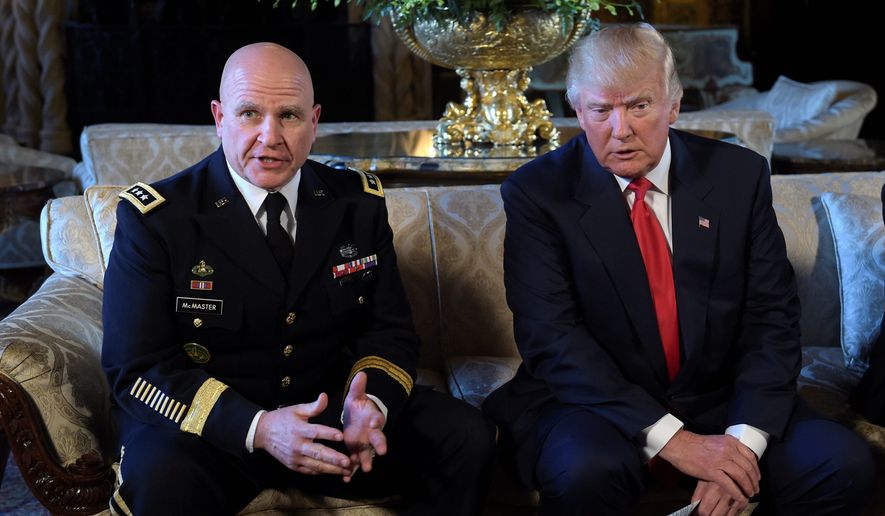President Trump’s national security adviser on Sunday signaled a shift in the administration’s stance toward Syria, which now includes regime change, as Russia and Iran recommit to supporting Syrian President Bashar Assad after the U.S. strike early Friday on a Syrian air base that is believed to have launched a chemical attack on civilians last week.
National Security Adviser H.R. McMaster said the Trump administration has two goals in Syria: defeating the Islamic State group and removing Mr. Assad from power. However, he added that Mr. Trump is seeking a global response that would include U.S. allies as well as Russia and Iran.
“It’s very difficult to understand how a political solution could result from the continuation of the Assad regime,” Mr. McMaster said on “Fox News Sunday.” “Now, we are not saying that we are the ones who are going to effect that change. What we are saying is, other countries have to ask themselves some hard questions. Russia should ask themselves , ‘Why are we supporting this murderous regime that is committing mass murder of its own population?’”
But Russia apparently was preoccupied with its own concerns. The Kremlin issued a statement Sunday saying that President Vladimir Putin had spoken via telephone with Iranian President Hassan Rouhani about the U.S. airstrike.
“Both sides noted the inadmissibility of aggressive U.S. actions against a sovereign state in violation of international law,” the statement said. “Vladimir Putin and Hassan Rouhani spoke in favor of an objective, unbiased investigation of all the circumstances of the chemical weapons incident on April 4 in the Syrian province of Idlib.”
Mr. Rouhani, a so-called moderate who faces re-election this year, said the U.S. strike would not affect Iran’s policy on Syria, while Supreme Leader Ayatollah Ali Khamenei said the Islamic republic would not withdraw in the face of similar aggressions.
“What the Americans did is a strategic mistake and offense. They are repeating offense of their predecessors,” Ayatollah Khamenei was quoted as saying by the official IRNA news agency.
Russia and Iran already had criticized the U.S. missile attack on Syria’s al-Shayrat airfield as a violation against a sovereign nation.
Late Thursday, Mr. Trump ordered two Navy destroyers in the Mediterranean to fire a total of 59 Tomahawk cruise missiles at targets on the airfield to punish the Assad regime for its assumed role in a sarin nerve gas attack that left nearly 100 people dead or wounded in Syria’s Idlib province. It is believed the aircraft that dropped the chemical weapon on Idlib had taken off from al-Shayrat airfield.
“No child of God should ever suffer such horror,” the president said from his Mar-a-Lago resort in Palm Beach, Florida, where he was hosting Chinese President Xi Jinping for a trade and security summit.
Debate on Sunday intensified among top White House foreign policy makers over the Trump administration’s first overt military action and its significance on America’s stance toward Syria’s brutal, confounding 6-year-old civil war.
Speaking on ABC’s “This Week,” Secretary of State Rex W. Tillerson simply stated that Washington’s position on Syria had not changed since the missile strike.
“We are asking Russia to fulfill its commitment, and we’re asking and calling on Bashar al-Assad to cease the use of these weapons,” Mr. Tillerson said, referring to a 2013 deal by the Obama administration in which Moscow guaranteed Syria’s chemical stockpiles had been removed. “Other than that, there is no change to our military posture.”
Before last week, Mr. Trump opposed action against Mr. Assad’s Russia-backed regime and framed the Syria problem as an issue of eliminating the Islamic State.
The president’s sudden policy about-face had Washington diplomatic insiders arguing whether the strikes set the stage for deeper U.S.-Russian talks than the Obama administration was able to achieve or whether they were merely low-risk, low-reward theater.
On Wednesday, Mr. Tillerson will become the first Trump administration official to visit Russia when he flies to Moscow for diplomatic talks. Kremlin representatives said the airstrikes on Syria dealt a significant blow to U.S.-Russian relations.
The Tillerson trip has leaders across Europe and the Middle East anxious. Both regions feel the strain of Syria’s refugee crisis, while the civil war has threatened security and stability across the Middle East, including Turkey, Lebanon, Jordan, Iraq, Iran and Israel.
In a CBS interview on Sunday, Mr. Tillerson confirmed that Washington had no specific information suggesting Russian involvement in the Idlib attack, which senior Pentagon officials briefly speculated.
He also brushed aside any U.S. fears that Moscow might retaliate.
“It was a very deliberate, very proportional and very targeted strike,” Mr. Tillerson said on CBS’ “Face the Nation.” “And Russia was never part of the targeting.”
Nikki Haley, U.S. ambassador to the United Nations, echoed Mr. McMaster’s dual goals for Syria, saying that the first U.S. priority is the destruction of the Islamic State but there can be multiple priorities.
“In no way do we look at peace happening in that area with Iranian influence,” Ms. Haley said on NBC’s “Meet The Press.” “In no way do we see peace in that area with Russia covering up for Assad. In no way do we see peace in that area with Assad as the head of the Syrian government.”
Other Republican leaders called for more clarity.
Sen. John McCain of Arizona, who supported the airstrike, said on “Face The Nation” that much more was required.
“Just a one-time deal is not going to be productive,” Mr. McCain said. “A very small percentage of the people who have been slaughtered in Syria have been slaughtered by chemical weapons. It’s been done by barrel bombs and indiscriminate killing and all the other war crimes that have been committed.”
Mr. McCain also poked Mr. Tillerson and Ms. Haley over the White House policy reversal and said this confusion could have contributed to the use of chemical weapons.
“I think it probably was partially to blame,” he said. “And Secretary Tillerson basically saying the same thing after kind of contradicting himself and then saying the same thing argues vigorously for a plan and a strategy.”
Sen. John Cornyn of Texas expressed his support for the missile strike but added that Mr. Trump must work with the Republican-led Congress to create a strategy.
“Congress needs to work with the president to try and deal with this long-term strategy, lack of strategy, really, in Syria,” Mr. Cornyn said on “Fox News Sunday.” “We haven’t had one for six years during the Obama administration, and 400,000 civilians have died and millions of people have been displaced internally and externally in Europe and elsewhere.”
• This article is based in part on wire service reports.
• Dan Boylan can be reached at dboylan@washingtontimes.com.




Please read our comment policy before commenting.